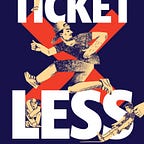Dibs!
When it snows in Chicago, the plows come out quickly and do their jobs well; the city gets an average of 36 inches per year, so the salt truck and plow drivers are rarely caught unprepared. The plows start by clearing the snow from the main thoroughfares and eventually get the side streets, so that within 12–18 hours of the end of the snowfall, cars can get back on the roads.
However, with so many cars parked on those roads, the plows of course can’t remove all the snow. That which tops and surrounds the cars must stay where it is until the owners of those cars shovel it themselves, or until it melts, which, given wintertime temperatures in Chicago, probably won’t be anytime soon.
I don’t drive often, so my strategy during this abnormally high-snowfall winter has been to wait until some of it has melted naturally and then to shovel a little at a time. Dig out the front-right wheel today, let a little snow melt, hopefully, then come back in a few days and get the back-right, and so on. I’m not going to spend an hour straight shoveling snow. (It’s not enough just to dig out the wheels; you also have to shovel quite a bit of snow from in front of your car and behind it.)
Not everyone, of course, can wait for Mother Nature to help them. Some folks have to drive their cars the morning after a snowstorm to get to work or to get their kids to school, so they shovel and shovel and shovel until the wheels can spin on solid asphalt and they can drive off.
But you won’t believe what some of those people do after extricating their cars. They attempt to reserve the spots their cars just vacated by scattering lawn chairs or old furniture in the now-vacant spot! In local parlance, this is called calling “Dibs.” As you can probably guess, it’s controversial.
This message goes out to the Dibs People out there.
That parking spot was never yours to begin with. It only temporarily belonged to you until such time as your car no longer sat on it! That’s how public parking spots work, and the rules of parking do not change just because it was more difficult to move your car.
If you’re a Dibs Caller, consider whether you’d accept its premise under other circumstances.
Say someone, in the middle of summer, noticed their car had a flat tire and proceeded to change it before leaving their parking spot. Surely the effort to change a tire is every bit as, if not more taxing than shoveling snow. Could that car owner rightfully install some lawn chairs to reserve the spot?
Of course not.
What if, on a picturesque spring day, you return home but must circle your block eight times before finding a parking spot? Having worked extra hard to find it, would you have any special right to it?
Of course not.
What if, immediately after a blizzard, someone went around digging out not just their own car, but the entire block? Would that person then have a right to all the parking spots he had cleared?
Of course not.
Dibs makes no sense. Why, just because you’ve done something that you would’ve had to do in order to use your car anyway, should you get a special right to a spot once you’ve left? I mean, if your battery died and you went to the effort of jump-starting it — which you would have to do in order to use your car at all — certainly no dibs could be called there, right?
I’m all for working hard and enjoying the fruits of your labor … if your labor went into something that belonged to you in the first place.
Another hypothetical: Imagine I arrive unannounced at your house and paint a beautiful, elaborate mural on the side wall. “Hey,” I might then say, “I put a lot of effort into this; the house now belongs to me.”
Totally cool, and totally in alignment with the kind of precedent we want to set, right?
Of course not.
You, Dibs Caller, have a totally incoherent and illogical belief system.
What’s worse, some of these Dibs callers take it very seriously. Come across a True Believer and park in their dibs-ed spot, they’re liable to key your hood or slash your tires. This … game, this sick, absurd farce, is a scourge on the city every winter. It flies in the face of justice, and I have my own way of dealing with it.
When I’m on foot, or on my bike, which is most of the time, here’s what’s going to happen: If I see lawn chairs, or old furniture, or orange parking cones, or anything other attempt to call “Dibs,” it’s getting tossed aside. That simple.
The Dibs Caller won’t know who it was; I’ll of course be wearing my double masks (actually, triple) since we all must keep each other safe during this still-raging, deadly pandemic. In fact, just in case Covid can spread via the eyes, I’ll be wearing dark safety goggles, too. You can never be too safe! So even if you catch me in the act, you won’t be able to identify me.
Maybe you’ll get back to your beloved parking spot before someone else parks there. Maybe you won’t. But this much I can promise: You won’t be able to take retribution on the person who parks there, for he or she will merely have lucked out and found an available, shoveled space.
And you, Dibs Callers, will just have to look for somewhere else to park.
If you enjoyed this story — and even if you didn’t — you should check out my book, Ticketless: How Sneaking Into The Super Bowl And Everything Else (Almost) Held My Life Together.
